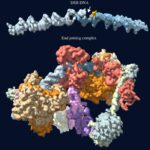Link to Pubmed [PMID] – 23023962
Link to HAL – Click here
Link to DOI – 10.1002/cbic.201200413
Chembiochem 2012 Nov;13(16):2439-44
Thermostable bacterial polymerases like Taq, Therminator and Vent exo(-) are able to perform DNA synthesis by using modified DNA precursors, a property that is exploited in several therapeutic and biotechnological applications. Viral polymerases are also known to accept modified substrates, and this has proven crucial in the development of antiviral therapies. However, non-thermostable polymerases of bacterial origin, or engineered variants, that have similar substrate tolerance and could be used for synthetic biology purposes remain to be identified. We have identified the α subunit of Escherichia coli polymerase III (Pol III α) as a bacterial polymerase that is able to recognise and process as substrates several pyrophosphate-modified dATP analogues in place of its natural substrate dATP for template-directed DNA synthesis. A number of dATP analogues featuring a modified pyrophosphate group were able to serve as substrates during enzymatic DNA synthesis by Pol III α. Features such as the presence of potentially chelating chemical groups and the size and spatial flexibility of the chemical structure seem to be of major importance for the modified leaving group to play its role during the enzymatic reaction. In addition, we could establish that if the pyrophosphate group is altered, deoxynucleotide incorporation proceeds with an efficiency varying with the nature of the nucleobase. Our results represent a great step towards the achievement of a system of artificial DNA synthesis hosted by E. coli and involving the use of altered nucleotide precursors for nucleic acid synthesis.

